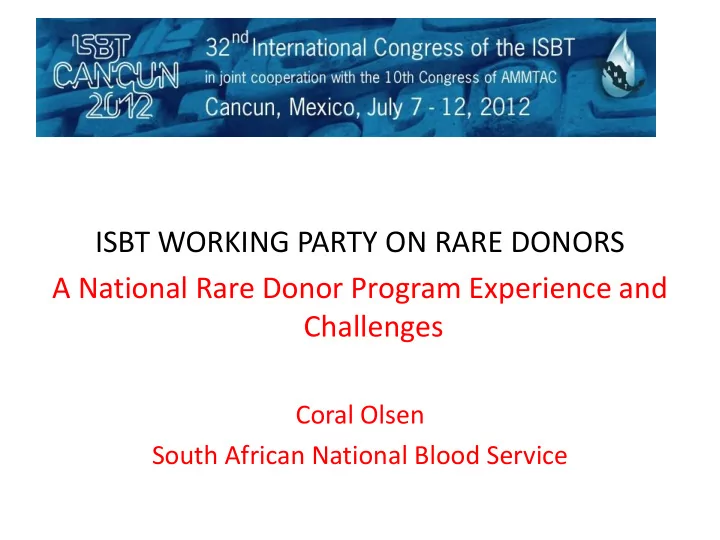

ISBT WORKING PARTY ON RARE DONORS A National Rare Donor Program Experience and Challenges Coral Olsen South African National Blood Service
Background • South Africa currently has two transfusion services to provide for our patients – South African National Blood Service (SANBS) – Western Province Blood Transfusion Service (WBTS) • SA rare donor file was established 35 years ago – Co-ordinated originally by the EPBTS, then by NBTS and now SANBS – Linked to International Panel of Rare Donors
Who Do We Consider A Rare Donor? • A donor that lacks a single high frequency antigen (frequency of <1% of the population) • A donor that possesses a low frequency antigen which the general population lacks • A donor that lacks a combination of multiple antigens (used for transfusion of patients with multiple antibodies)
The Role Of The Rare Donor Program • Identify the rare blood types within the South African population • Identify blood donors of these rare types • Store donations from these donors • Ultimately to assist with the provision of rare donations to patients with antibodies (high frequency or multiple) both nationally or internationally if required
What Happens When We Receive A Request? • Determine if we have appropriate donors on our panel • Check fresh stocks of rare donations for the appropriate type • Check frozen stocks for the appropriate type • Bleed local rare donors if necessary • Perform family studies • Consider autologous donation if possible
What Do We Do If None Of These Are Possible? • Contact the International Panel of Rare Donors • Contact various centers from the contact list provided by the IDP to determine availability of donors • Facilitate the import of appropriate donations required for the request
What Rare Donors Do We Have In South Africa? Rare Type Rare Type Bombay Oh Kp(a+b-) Do(a-) Lan – negative Ge – negative Lu(b-) hr S - negative Lu:-5 Adult I – negative p phenotype In(a+b-) Rhnull Jk:-3 Rh:-34 Js(b-) U - negative k - negative Vel – negative Kn(a-) Yt(a-)
Requests For Rare Donations 2009 – 2012
Increase Demand For Multiple Antigen Negative Donations • In the three year period more than 500 donations have been issued for this purpose • Although the number does vary from year to year – The first two years 2009 & 2010 a total of 115 multiple antigen negative donations were issued – In 2011 alone a total of 385 multiple antigen negative donations were issued
The Search For Rare Donors • Screening of routine blood donations – Screening has been limited as a result of the implementation of a new IT system – Stocks of rare antisera are limited due to drop in number of donors with antibodies • Tracing of patients with rare antibodies to improve stocks • Family studies on patients and donors with rare types
Screening Of Routine Donations • IT database identifies new donors on their second donation • A marker is attached to the group O donor according to their Rh type and ethnicity • Ensure availability of rare antisera for screening • Tracing of rare donors once identified
South African Population Demographics African Colored Asian White % 79 9 3 9 Screening Of Group O Rh Positive Donors • White and Asian Antigen Type Antigen Type Kp a K Kp b k Vel Lu:5
Screening Of Group O Rh Positive Donors • African and Colored Antigen Type Antigen Type hrS Jsb Rh:34 Ge U Lan Anti-STEM Screening Of Group O Rh Negative Donors
How Do We Manage Our Rare Donors? • Most of our rare donors were identified in and around Kwa-Zulu Natal • We have a dedicated rare donor bleeding sister who keeps a list of our rare donors • She will bleed a range of rare types at regular intervals • Should we need donations for a specific request she will contact the donors and bleed
Inventory Control Of Rare Donors • Our donors are tagged to be identified at the processing center • Once separated the donations are put into a fridge dedicated for rare donations • This inventory is checked daily to determine the specific outcome of each donation – Stored frozen – Kept fresh for a specific patient
• It is preferable to freeze at least two donations per annum from each rare type bled • Should the donation be stored frozen all routine viral testing must be completed and the rare type confirmed within 6days prior to storage • Should the donation not be stored frozen it is kept fresh or may be taken for laboratory use storage
Current Challenges Experienced • There has been an increase in non-specific auto-antibodies which obscure allo-antibodies • The decrease in immunizing events due to improved education has resulted in further scarcity of rare polyclonal reagents • Challenges to commitment and dedication from our rare donors in our increasingly busy lifestyles
Conclusion The South African Rare Donor File continues to facilitate as far as possible the provision of rare donations to those patients who have developed antibodies to high frequency antigens and those that may have developed antibodies of multiple specificities
Acknowledgments • To the staff of the South African National Blood Services Immunohaematology Reference Laboratory who facilitate the provision of these rare donations for our patients in need. • To the staff of the Special Donor Services, Specialized Processing Department, Inventory, hospital blood banks and our neighboring service Western Province Blood Transfusion Service for their co-operation
Thank-you
Recommend
More recommend